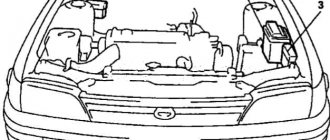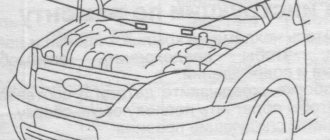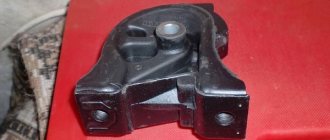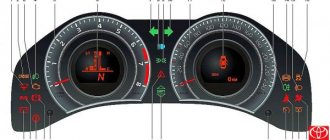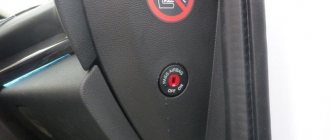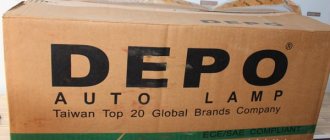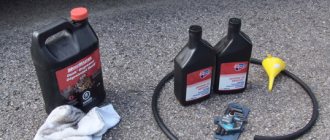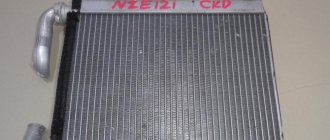The engines of all vehicles require maintenance and replacement of fluids. Changing the oil in a Toyota Corolla, like in any other car, is not a difficult task. The replacement process is essentially identical for all vehicles. The main thing is to choose the right oil and do everything according to the instructions.
Toyota Corolla E12
With the engine at operating temperature and turned off, check the oil level at the dipstick.
1. To obtain a reliable reading, the vehicle must be placed on a level surface. After turning off the engine, wait a few minutes for the oil to drain back to the bottom of the engine.
2. Pull out the level indicator rod, holding a rag under its end, and wipe it.
3. Reinsert the level indicator rod as deeply as possible, otherwise the level measurement result will be incorrect.
4. Pull out the level indicator rod, holding a rag under the end, and look at the oil level.
Be careful not to spill engine oil on vehicle parts.
If the oil level is below or only slightly above the low level, add the same type of engine oil already in use in the engine.
Remove the oil filler cap and add engine oil little by little, checking the level with the gauge rod. We recommend using a funnel when adding oil.
The approximate amount of oil required to raise the level between the low and full level on the dipstick is as shown below: 1.3 L (L)
For engine oil capacity, please refer to "Maintenance Specifications"
When the oil level reaches the desired level, replace the filler cap and tighten it by hand.
♦ Be careful not to spill engine oil on vehicle parts,
♦ Avoid overfilling, or the motor may be damaged.
♦ After adding oil, check the oil level again using the indicator rod.
SELECTION OF ENGINE OIL
Your Toyota vehicle uses Toyota Genuine Motor Oil (genuine Toyota motor oil). Toyota recommends using genuine motor oil. You can also use another motor oil of suitable quality.
20W-50H 15W-40 - Universal engine oil of API SJ or SL quality
10W-30h5W-30 — API qualities SJ “Energy-Conserving”, SL “Energy-Conserving” or ILSAC universal motor oil
Recommended viscosity (SAE):
If you use SAE 10W-30 or higher viscosity motor oil in extremely cold temperatures, the engine may become difficult to start, so it is recommended to use SAE 5W-30 motor oil.
API service symbol
ILSAC Certification Mark
Oil identification marks
One or both of the two registered API marks are affixed to some oil containers to help you select the oil to use.
The API service symbol is located somewhere on the outside of the container.
The upper part of the label shows the quality of the oil according to API (American Petroleum Institute), designated, for example, as SL. The central part of the label shows the SAE viscosity grade, for example SAE 5W-30. The inscription “Energy-Conserving” at the bottom of the label means that the oil has fuel-saving properties.
The ILSAC (International Lubricant Standardization And Approval Committee) certification mark is displayed on the front of the container.
To ensure superior lubrication of your engine, Toyota recommends the use of Toyota Genuine Motor Oil, which has been specifically tested and approved for all Toyota engines.
For detailed information about Toyota Genuine Motor Oil (Genuine Toyota Motor Oil), please contact any authorized Toyota dealer or repairer. You can also use other motor oils of suitable quality.
Source
How to check the oil level in a Toyota Corolla
The verification operation takes only a few minutes. It can be done in just a few simple steps:
Start the car for about 30 seconds and then turn it off, leaving it idle for a few minutes to allow the oil to settle.
The dipstick for checking is located under the hood, in the engine. Appears in the shape of a ring, usually yellow in color.
We take out the dipstick. On it you can see two notches near the tip indicating the maximum and minimum levels.
It is necessary to thoroughly clean the dipstick with a cloth or piece of paper towel, return it to its place and pull it out again.
Having examined the lower part of the dipstick, which is again in the oil, we determine the level value. It should be between the two marks MIN and MAX (ideal is a millimeter below the maximum mark).
How to change the oil yourself
Before starting work, the machine must be placed on a flat surface and secured by setting the handbrake.
First, you need to warm up the engine, since cold oil has poor fluidity and will not completely drain from the engine. If new oil is mixed with waste oil, it will lose its characteristics.
It is ideal if the replacement is carried out in an inspection hole, but if there is none, you can use a jack. The Toyota Corolla has a crankcase guard installed; it must be removed to gain access to the drain plug.
For waste fluid you will need a 5 liter container. We unscrew the drain plug and wait until the old oil (black) flows into the container.
You need to be careful, the mining can be hot.
When twisting the nut, you need to make sure that the sealing ring located on it does not fall into the “working off” container.
We take a pre-prepared new filter. We install it in place of the old one. It is not allowed to install a new filter on an old sealing ring in the seat.
By the way, when changing the filter on a Toyota Corolla, there is no need to fill it with oil.
We screw the plug into place and start changing the oil. New is poured through the filler neck on the engine.
Having reached the required level, start the engine. The oil level should drop. Add and check the dipstick. We start the car again and let it run for 15 minutes.
Changing the oil in a Toyota Corolla engine
The engines of all vehicles require maintenance and replacement of fluids. Changing the oil in a Toyota Corolla, like in any other car, is not a difficult task. The replacement process is essentially identical for all vehicles. The main thing is to choose the right oil and do everything according to the instructions.
Automatic transmission problems on Toyota Corolla
A small amount of lubricant in the box can lead to a huge number of problems. As a rule, when its level is low, the pump pumping oil begins to capture air along with the working fluid. As a result of this process, an emulsion is formed that compresses very well. The oil begins to lose one of its most important properties - it becomes easily compressible under good pressure. And this already leads to the emergence of such problems as:
- Poor heat dissipation from the automatic gearbox;
- Low oil pressure in the system;
- The lubrication of the working parts of the automatic transmission deteriorates, which in turn very quickly disables the box, etc.
Therefore, you should carefully monitor the amount of oil in the automatic transmission of your car, otherwise you will have to pay a lot of money for its restoration and repair because of some little thing.
An excess can lead to increased load on the oil pump, as a result of which it can easily fail. And since they are not repairable, replacing it can cost a lot. Having dealt with possible problems, let's talk about how much oil needs to be poured into the box and what volume is optimal for the normal operation of the box.
How much oil to fill in Toyota Corolla of different modifications
Corollas were and are produced with different engines, different volumes and powers. The amount of oil poured into the engine varies depending on engine size, number of cylinders and power.
Accordingly, the volume of oil that needs to be filled depends on the Toyota Corolla engine.
| engine's type | Oil volume, liters |
| 1.33 (1NR-FE) | 3,4 |
| 1.3 (2NZ-FE); 1.6 (3ZZ-FE); 1.5 NZ | 3,7 |
| 1.8 1ZZ-Fe | 3,8 |
| 1.6 (1ZR-FE); 1.8 VVTL-i (2ZR-FE); 2.0 (3ZR-FE) | 4,2 |
| 2.4 AZ | 4,3 |
| 1.4 (4ZZ-FE) | 4,7 |
| 1.4 TD (1ND-TV) | up to 5 |
What type of oil is suitable for Toyota Corolla
The type of oil depends on the generation of the Corolla and the installed engine. For example, engines from the 1st to the 9th generation are filled with oil that meets the API SL and ACEA A3/B4 standards. These include compositions with viscosity 0W30 and 5W40.
They provide engine protection in different operating modes, regardless of climatic conditions.
Generations 9 to 11 are equipped with more modern internal combustion engines, in which it is recommended to use motor oils that meet the ILSAC GF-5 standard.
This standard aims to reduce the amount of phosphorus, which results in low levels of harmful substances in the exhaust. Also, these lubricants, according to manufacturers, reduce fuel consumption.
Oils recommended for Corolla diesel engines include those falling under the ACEA C2 standard. Lubricants of this class are aimed at better protecting engine parts and helping to reduce harmful emissions.
Semi-synthetics are categorically not recommended, as they contribute to the formation of soot and scale in the engine. In addition to those recommended by the manufacturer, analogues performed well:
Oil for Toyota Corolla E150
For Corolla engines in the 150 body, synthetic oil of different viscosities is suitable. But the manufacturer recommends taking into account operating conditions and filling only original oil with a viscosity of 5W-40, 5W-30 and 0W-20.
The 150 sedan can be filled with:
The replacement interval regulated by the car manufacturer is 10 thousand km. The oil filter also needs to be changed immediately.
Source
The process of changing automatic transmission fluid
If you want to replace the fluid yourself, you will need the following in advance:
Using a funnel, pour clean oil through the fill hole in the amount that was drained.
The process consists of several stages:
When pouring oil, pay attention to the fact that the volume of drained and new fluid must match.
It is better to add a little less lubricant than to overfill it. Adding transmission fluid to an automatic transmission is easier than pumping out excess fluid.
What kind of oil should be poured into the Toyota Corolla 120 and 150 engine?
Oil for Toyota Corolla is selected taking into account the type of engine, its condition and climatic conditions. The legendary Japanese compact car has been produced since 1966; just 8 years after its launch, the model entered the Guinness Book of Records as the best-selling car in the world. The model has been supplied to Russia since the fourth generation, and the twelfth generation is already on sale today.
Over the entire existence of the car, a huge number of engines have been designed, mostly gasoline, but there are also several diesel power units. In this article we present oils recommended by the manufacturer, as well as analog lubricants.
Gasoline engines:
Diesel engines:
According to API, gasoline engines should be filled with a lubricant of at least SL or SM. In new and relatively new cars (manufactured from 2021 inclusive) it is worth pouring exclusively synthetic material with API quality SN. It is advisable to convert used engines to semi-synthetics.
Original oil
First of all, you should look at the car’s service book, which contains information about the preferred engine oil in terms of quality class and viscosity index. For example, the instructions for the Toyota Corolla 150 indicate that liquid with a viscosity index of 10W-30, 5W-30, 5W-20, 0W-20 according to SAE should be poured.
Frequency of inspection. Features of the operation
Engine lubrication system
Previously, among professional drivers, checking technical fluids was included in the list of so-called daily maintenance (DA) tasks. Before the first departure, the driver had to make sure that the amount of oil in the power plant was normal, and if there was a shortage, top up.
Modern engines do not require daily checking of the lubricant level; it is enough to perform this operation every 1000 km. But note that this is a conditional value. Ideally, you need to look under the hood and check the oil level at least once every 1000 km, or even better twice a month. It would not be superfluous to check the lubricant level more frequently. This procedure is simple, but it will help to avoid serious damage and identify engine problems in the early stages.
Despite the fact that checking the amount of lubricant is a simple operation, there are several nuances to it. And the first of them is which engine to perform the work on - hot or cold? The EO regulations, which were used before, indicated that the test was carried out “cold”, that is, before the first start of the engine after an overnight stay.
But many people do this work on a hot engine, which is not a violation or an incorrect action. But in this case, the test result will be slightly different than when determining the “cold” level. Oil, like any liquid, expands after heating, which leads to an increase in volume. In addition, even if you give time for the lubricant to drain after stopping the engine, it still will not have time to completely drain into the pan and some will remain in the channels. For this reason, not a single automaker indicates the exact oil level in the engine; it simply must be in a certain range - between the marks on the dipstick.
What kind of oil to pour into a Toyota Corolla diesel engine?
Engine oil for Toyota Corolla with a diesel engine must also be original. Diesel power units are extremely sensitive to the quality of technical fluid. Incorrectly selected fluid can lead to problems with the DPF. Toyota suggests using branded oil with a viscosity of 0W-30 or 5W-30 according to SAE. An all-season oil that meets the API SL or SM specification, a 5W-30/10W-30 all-season oil with a quality class of SM or SN and marked “energy saving” is suitable.
Toyota Corolla diesel engine oils
Toyota Motor Oil 5W-30 SN GF-5
4 liters Article: 08880-10705
Average price: 2200 rubles
1 liter Article: 08880-10706
Average price: 650 rubles
| Toyota Engine Oil SN 0W-30 5 liters Article: 08880-80365 Average price: 2600 rubles 1 liter Article: 08880-80366 Average price: 720 rubles | |
| Shell Helix Ultra ECT C2/C3 0W-30 4 liters Article: 550042353 Average price: 2720 rubles 1 liter Article: 550042390 Average price: 900 rubles | Mobil-1 ESP Formula 5W-30 4 liters Article: 152053 Average price: 2970 rubles 1 liter Article: 152622 Average price: 800 rubles |
Sequence of checking the lubricant level in a manual transmission on a Toyota Corolla 150
Instructions for checking the oil level in a manual transmission.
Filler plug location
Lubricant level control
Normal lubrication level
Volume
When it’s time to change the oil, the question becomes how many liters of oil to fill?! The answer to this question depends on the engine installed under the hood of your Toyota Corolla.
Below is a list of the entire Toyota Corolla 120 model range with a list of engines, and the required oil filling volumes when replacing.
| Body number | Engine | Model/Volume | Oil capacity, liters |
| Gasoline engines (motor oil classification API SJ..SL / ILSAC GF-3) | |||
| NZE120, NZE124 (4WD) | 2NZ-FE | 1.3i/1.3 | 3.7 |
| ZZE12 | 4ZZ-FE | 1.4i/1.4 | 4.2 |
| NZE121, ZZE124 (4WD) | 1NZ-FE | 1.5i/1.5 | 3.7 |
| ZZE12 | 3ZZ-FE | 1.6i/1.6 | 4.2 |
| ZZE122 | 1ZZ-FE | 1.8i/1.8 | 3.7 |
| ZZE12 | 2ZZ-GE | 1.8i VVTL-i/1.8 | 4.4 |
| Diesel engines (oil classification API CD, CF..CF-4 / ACEA B1, ILSAC GF-3) | |||
| NDE12 | 1ND-TV | 1.4 D4-D/1.4 | 4.3 |
| CDE120 | 1CD-FTV | 2.0d/2.0 | 5.9 |
| CE121 | 3C-E | 2.2d/2.2 | 5.1 |
It is also worth considering that
0.5 liters of oil is additionally intended for the Toyota Corolla oil filter.
The recommendations are relevant for the Corolla E120, but the above engines, which, depending on the year of manufacture, were also installed on other modifications, therefore, all recommendations are relevant not only for the Corolla, but also for other models with a similar engine. The list of models is given below (models are given not only for the Russian market, but also for Europe, the USA, and Japan):
| Model | Engine & Volume | Year of issue |
| Allex E120 | 1NZ 1.5/1ZZ 1.8/2ZZ 1.8 | 2001-2006 |
| Allion T240 | 1NZ 1.5/1ZZ 1.8 | 2001-2007 |
| Allion T260 | 1NZ 1.5 | since 2007 |
| Auris E150 | 4ZZ 1.4/1NZ 1.5/1ND 1.4 | 2006-2012 |
| Auris E180 | 1NZ 1.5/1ND 1.4 | 2012-2018 |
| Avensis T220 | 3ZZ 1.6/1ZZ 1.8/1CD 2.0 | 1997-2003 |
| Avensis T250 | 1ZZ 1.8 | 2003-2009 |
| Avensis Verso | 1CD 2.0 | 2001-2009 |
| Belta XP90 | 2NZ 1.3 | 2005-2012 |
| bB NCP30 | 2NZ 1.3/1NZ 1.5 | 2000-2005 |
| Caldina T190 | 3C-E 2.2 | 1992-2002 |
| Caldina T240 | 1ZZ 1.8 | 2002-2007 |
| Celica T230 | 1ZZ 1.8/2ZZ 1.8 | 1999-2006 |
| Corolla E100 | 3C-E 2.2 | 1991-2000 |
| Corolla E110 | 4ZZ 1.4/3ZZ 1.6/1ZZ 1.8/1CD 2.0 | 1997-2001 |
| Corolla E150 | 4ZZ 1.4/1ND 1.4 | 2006-2013 |
| Corolla E180 | 1ND 1.4 | 2016-2019 |
| Corolla Axio E140, E160 | 1NZ 1.5 | since 2006 |
| Corolla Fielder E120 | 1NZ 1.5/3C-E 2.2 | 2000-2006 |
| Corolla Fielder E140, E160 | 1NZ 1.5/2ZZ 1.8 | since 2000 |
| Corolla Rumion E150 | 1NZ 1.5 | 2007-2015 |
| Corolla Runx E120 | 1NZ 1.5/1ZZ 1.8/2ZZ 1.8 | 2001-2006 |
| Corolla Spacio E120 | 1NZ 1.5/1ZZ 1.8 | 2001-2007 |
| Corolla Verso E121, R10 | 1ZZ 1.8 | 2004-2009 |
| Echo XP10 | 1NZ 1.5 | 1999-2002 |
| Funcargo XP20 | 2NZ 1.3/1NZ 1.5 | 1999-2005 |
| Isis XM10 | 1ZZ 1.8 | 2004-2009 |
| ist XP60, XP110 | 2NZ 1.3/1NZ 1.5 | 2002-2016 |
| Lite Ace (Town Ace) R40 / R50 | 3C-E 2.2 | 1996-2007 |
| Matrix E130 | 1ZZ 1.8 | 2002-2007 |
| MR-S W30 | 1ZZ 1.8 | 1999-2007 |
| Opa XT10 | 1ZZ 1.8 | 2000-2005 |
| Platz XP10 | 2NZ 1.3/1NZ 1.5 | 1999-2005 |
| Porte NP10 | 2NZ 1.3 | 2004-2012 |
| Porte NP140 | 1NZ 1.5 | since 2004 |
| Premio T240, T260 | 1NZ 1.5/1ZZ 1.8 | since 2001 |
| Probox XP50, XP160 | 2NZ 1.3/1NZ 1.5/1ND-TV 1.4 | since 2002 |
| Ractis P100/P120 | 1NZ 1.5 | 2005-2016 |
| Raum Z20 | 1NZ 1.5 | 2003-2011 |
| RAV4 XA20 | 1ZZ 1.8/1CD 2.0 | 2000-2005 |
| Sienta NCP80, XP170 | 1NZ 1.5 | since 2003 |
| Spade NP140 | 1NZ 1.5 | since 2012 |
| Sprinter E100, E110 | 3C-E 2.2 | 1995-2002 |
| Succeed XP50, XP160 | 1NZ 1.5/1ND 1.4 | since 2002 |
| Town Ace R40 | 3C-E 2.2 | 1996-2008 |
| Vista / Vista Ardeo V50 | 1ZZ 1.8 | 1998-2003 |
| Vitz XP10 | 2NZ 1.3/1NZ 1.5 | 1999-2005 |
| Vitz XP90, XP130 | 1NZ 1.5 | since 2005 |
| Voltz E130 (Pontiac Vibe) | 1ZZ 1.8/2ZZ 1.8 | 2002-2004 |
| WiLL Cypha XP70 | 2NZ 1.3/1NZ 1.5 | 2002-2005 |
| WiLL Vi XP10 | 2NZ 1.3 | 2000-2001 |
| WiLL VS XE120 | 1NZ 1.5/1ZZ 1.8/2ZZ 1.8 | 2001-2004 |
| Wish XE10 | 1ZZ 1.8 | 2003-2009 |
| Yaris XP10, XP90, XP130 | 1NZ 1.5/1ND-TV 1.4 | since 1999 |
Which is better to fill the Corolla 120 with engine oil, original Toyota oil or from other lubricant manufacturers?!
The manufacturer recommends filling Toyota Corolla with original synthetic motor oil Toyota Genuine Motor Oil API (Toyota Engine Oil), but in addition to the original, it is also possible to fill in oils from other manufacturers, such as Shell, Castrol, Mobil, Total and so on.
At this stage of choosing between brands, everyone decides for themselves, based on personal experience, since car owners each choose oil according to their beliefs, capabilities and requirements. For some, brand “A” is preferable, while others have to buy oil “B”, since oil “A” is not available.

